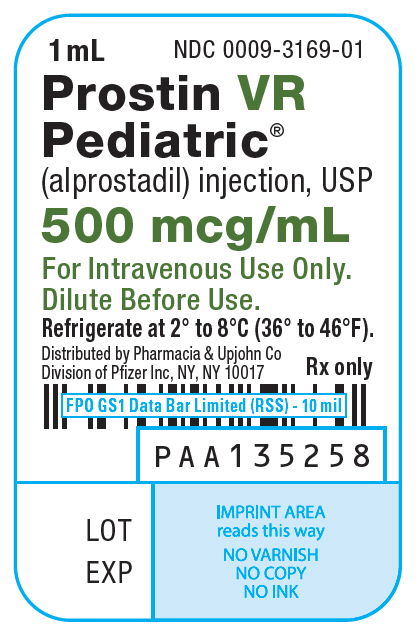FDA records indicate that there are no current recalls for this drug.
Are you a medical professional?
Trending Topics
Prostin Vr Pediatric Recall
Get an alert when a recall is issued.
Questions & Answers
Side Effects & Adverse Reactions
See WARNING box.
NOTE: PROSTIN VR PEDIATRIC Sterile Solution must be diluted before it is administered. See dilution instructions in DOSAGE AND ADMINISTRATION section.
The administration of PROSTIN VR PEDIATRIC to neonates may result in gastric outlet obstruction secondary to antral hyperplasia. This effect appears to be related to duration of therapy and cumulative dose of the drug. Neonates receiving PROSTIN VR PEDIATRIC at recommended doses for more than 120 hours should be closely monitored for evidence of antral hyperplasia and gastric outlet obstruction.
PROSTIN VR PEDIATRIC should be infused for the shortest time and at the lowest dose that will produce the desired effects. The risks of long-term infusion of PROSTIN VR PEDIATRIC should be weighed against the possible benefits that critically ill infants may derive from its administration.
Legal Issues
There is currently no legal information available for this drug.
FDA Safety Alerts
There are currently no FDA safety alerts available for this drug.
Manufacturer Warnings
There is currently no manufacturer warning information available for this drug.
FDA Labeling Changes
There are currently no FDA labeling changes available for this drug.
Uses
PROSTIN VR PEDIATRIC Sterile Solution is indicated for palliative, not definitive, therapy to temporarily maintain the patency of the ductus arteriosus until corrective or palliative surgery can be performed in neonates who have congenital heart defects and who depend upon the patent ductus for survival. Such congenital heart defects include pulmonary atresia, pulmonary stenosis, tricuspid atresia, tetralogy of Fallot, interruption of the aortic arch, coarctation of the aorta, or transposition of the great vessels with or without other defects.
In infants with restricted pulmonary blood flow, the increase in blood oxygenation is inversely proportional to pretreatment pO2 values; that is, patients with low pO2 values respond best, and patients with pO2 values of 40 torr or more usually have little response.
PROSTIN VR PEDIATRIC should be administered only by trained personnel in facilities that provide pediatric intensive care.
History
There is currently no drug history available for this drug.
Other Information
PROSTIN VR PEDIATRIC Sterile Solution for intravascular infusion contains 500 micrograms alprostadil, more commonly known as prostaglandin E1, in 1.0 mL dehydrated alcohol.
The chemical name for alprostadil is (11α,13E,15S)-11,15 dihydroxy-9-oxo-prost-13-en-1-oic acid, and the molecular weight is 354.49.
Alprostadil is a white to off-white crystalline powder with a melting point between 110° and 116°C. Its solubility at 35°C is 8000 micrograms per 100 mL double distilled water.
Structural Formula

Sources
Prostin Vr Pediatric Manufacturers
-
Pharmacia And Upjohn Company
![Prostin Vr Pediatric (Alprostadil) Injection, Solution [Pharmacia And Upjohn Company]](/wp-content/themes/bootstrap/assets/img/loading2.gif)
Prostin Vr Pediatric | Pharmacia And Upjohn Company
![Prostin Vr Pediatric (Alprostadil) Injection, Solution [Pharmacia And Upjohn Company] Prostin Vr Pediatric (Alprostadil) Injection, Solution [Pharmacia And Upjohn Company]](/wp-content/themes/bootstrap/assets/img/loading2.gif)
The preferred route of administration for PROSTIN VR PEDIATRIC Sterile Solution is continuous intravenous infusion into a large vein. Alternatively, PROSTIN VR PEDIATRIC may be administered through an umbilical artery catheter placed at the ductal opening. Increases in blood pO2 (torr) have been the same in neonates who received the drug by either route of administration.
Begin infusion with 0.05 to 0.1 micrograms alprostadil per kilogram of body weight per minute. A starting dose of 0.1 micrograms per kilogram of body weight per minute is the recommended starting dose based on clinical studies; however, adequate clinical response has been reported using a starting dose of 0.05 micrograms per kilogram of body weight per minute. After a therapeutic response is achieved (increased pO2 in infants with restricted pulmonary blood flow or increased systemic blood pressure and blood pH in infants with restricted systemic blood flow), reduce the infusion rate to provide the lowest possible dosage that maintains the response. This may be accomplished by reducing the dosage from 0.1 to 0.05 to 0.025 to 0.01 micrograms per kilogram of body weight per minute. If response to 0.05 micrograms per kilogram of body weight per minute is inadequate, dosage can be increased up to 0.4 micrograms per kilogram of body weight per minute although, in general, higher infusion rates do not produce greater effects.
Dilution InstructionsTo prepare infusion solutions, dilute 1 mL of PROSTIN VR PEDIATRIC Sterile Solution with Sodium Chloride Injection USP or Dextrose Injection USP. Undiluted PROSTIN VR PEDIATRIC Sterile Solution may interact with the plastic sidewalls of volumetric infusion chambers causing a change in the appearance of the chamber and creating a hazy solution. Should this occur, the solution and the volumetric infusion chamber should be replaced.
When using a volumetric infusion chamber, the appropriate amount of intravenous infusion solution should be added to the chamber first. The undiluted PROSTIN VR PEDIATRIC Sterile Solution should then be added to the intravenous infusion solution, avoiding direct contact of the undiluted solution with the walls of the volumetric infusion chamber.
Dilute to volumes appropriate for the pump delivery system available. Prepare fresh infusion solutions every 24 hours. Discard any solution more than 24 hours old.
Sample Dilutions and Infusion Rates to Provide a Dosage of 0.1 Micrograms per Kilogram of Body Weight per Minute Add 1 ampoule (500 micrograms) alprostadil to: Approximate Concentration of resulting solution (micrograms/mL) Infusion rate (mL/min per kg of body weight) Example: To provide 0.1 micrograms/kilogram of body weight per minute to an infant weighing 2.8 kilograms using a solution of 1 ampoule PROSTIN VR PEDIATRIC in 100 mL of saline or dextrose: INFUSION RATE = 0.02 mL/min per kg × 2.8 kg = 0.056 mL/min or 3.36 mL/hr. 250 mL 2 0.05 100 mL 5 0.02 50 mL 10 0.01 25 mL 20 0.005
Login To Your Free Account


